A question I am asked often is “How much does low-carb cost?”.
Many perceive changing from a high-carb diet to a low-carb diet will cost a small fortune. Read on to see why I don’t believe it does and my top tips to help you save money while you transition to low carb.
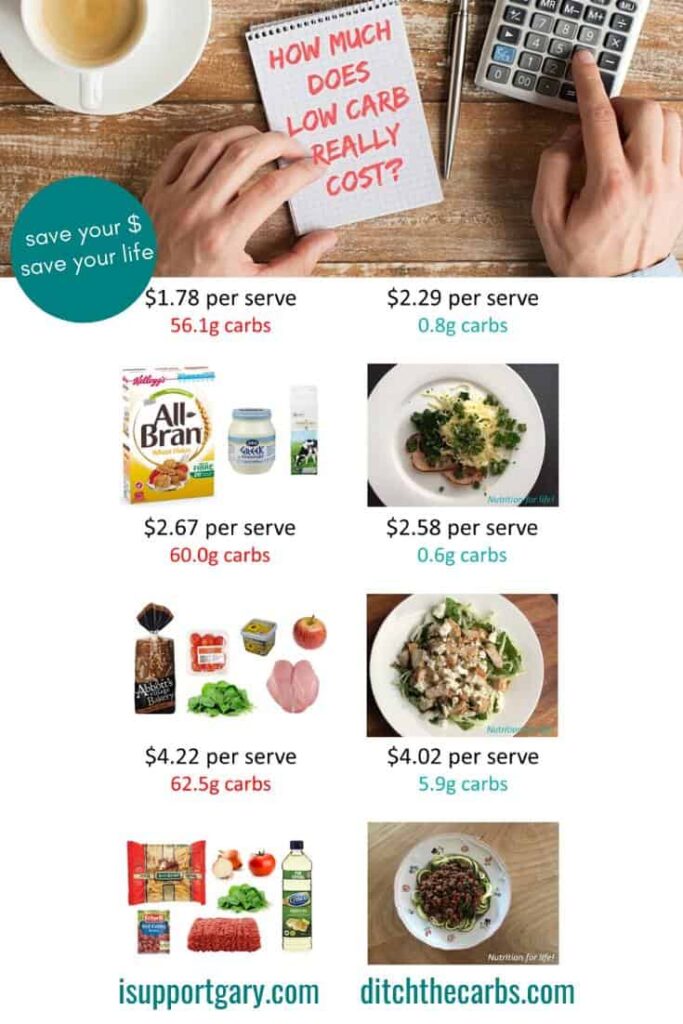
How much does low-carb and keto cost?

Low-Carb Cost vs High-Carb Cost
To truly understand how much does low-carb costs, it can be broken down further into short-term costs and long-term costs.
Short-term costs are your immediate expenditure such as your grocery bill whereas long-term costs are medical bills, supplements, and other lifestyle burdens that you cannot put a price on.
Are you ready to lose weight and heal your body for life (without dieting, drugs, or making yourself miserable)?

Our free on-demand video training will walk you through how to make this THE year you set health goals…and keep them.
There are so many factors beyond money. Health, pleasure, well-being, contentment, calmness, weight, and longevity to name just a few.
There are some easy ways to save money and buy cheaper too.
Short term costs
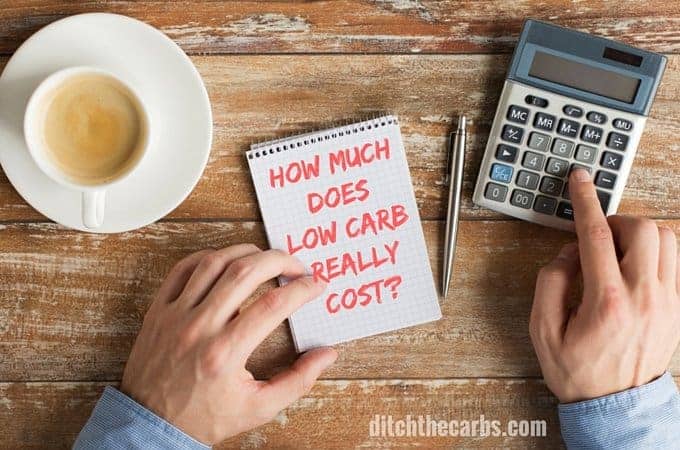
How To Calculate An Accurate Budget
Before we question how much does low-carb cost, how do you accurately calculate your weekly food budget, to begin with?
The biggest mistake people make is not to include their snacks, coffees, drinks, meals, vending machines, shared morning teas, that box of biscuits that are sold in the staff room/cafeteria, and of course, eating out.
When one reader shuddered at how much I spent at my weekly grocery visit, we went through her budget together and realized she only calculated what she spent at the grocery store ($100/week).
What she forgot to include was her accumulated weekly spend of $150 on work lunches, drinks, bars, snacks, doughnuts on the way home from work, and the chocolate she bought at the petrol station 3 x week.
The true cost is every single cent you spend on food and drink each and every week.
Grocery budget choices

For me, it’s about choice.
Do I choose short-term comfort over long-term investments?
I can spend $5 buying a coffee, or I can spend $5 on a dozen eggs. I can spend $40 on highly processed protein powder, or I can buy 8 dozen eggs (the best complete source of protein there is).
I no longer buy cakes, muffins, crisps and biscuits, I spend that money on ingredients to make nutritious low-carb baking instead. I see my food budget as an investment.
Long-term costs

There are numerous costs that are a direct result of a high-carb diet.
The ever-increasing monetary cost of medications, health supplements, hospital, and doctors visits. These can run into the thousands.
Avoid these future costs now by eating low-carb unprocessed real food and you may reduce your risk of heart disease, Type 2 diabetes, obesity, dementia, many cancers and all the complications associated with chronic high blood sugars and an inflammatory diet.
Do you want to be able to tie your own shoelaces at 80 or have someone do it for you?
We need to eat real food now because chronic health conditions don’t happen overnight. What we eat today, will directly influence our future.
Cheap low-carb meals

There is a misconception that cooking homemade low-carb meals from scratch is more expensive than their old high-carb processed diet.
First, I would say they are not making an equal comparison.
Processed food is not real food. Much of it is cheap fake food. Most of it is made with cheap processed grains to bulk up a meal.
Second, many believe when you go low carb you have to eat free-range, grass-fed organic food, but these are simply out of the reach of most.
Go for the best you can afford as often as you can.
Those people who need the most help will still benefit from swapping their burgers, fries, and sodas to regular meat and regular vegetables.
I have 100 top tips to help you save money at the grocery store. Please leave me your top tip too.
Grocery bill charts
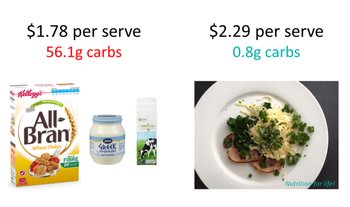
Breakfast
Breakfast can be cheap grains which will encourage ravenous hunger by 10 am and virtually no nutrition OR it can be a
- sustaining meal
- a substantial amount of protein
- leafy greens
- plenty of healthy fats to keep you full until lunchtime
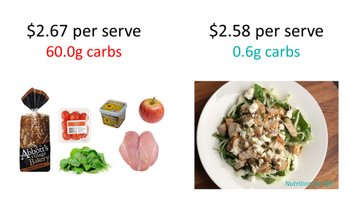
Lunch
Lunch can be a chicken, salad sandwich with an apple, OR it can be transformed into
- a filling chicken salad
- add plenty of olive oil poured over the top
- three times the salad, nutrients and fibre
Remember these are the costs of making these lunches at home, if you were to buy the sandwich at a cafe, it would easily be twice the cost.
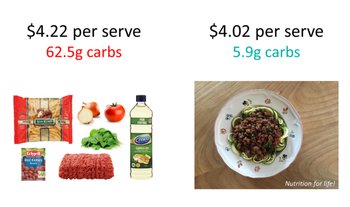
Dinner
Dinner could be a regular pasta bolognese which leaves you feeling bloated afterwards, OR it could be
- Made with wonderful vibrant zoodles
- No cheap grains and cooked starch from the pasta
- Extra nutrients and vitamins
- 1/10 of the carbs
Image credit: Going Against The Grain – The website supports Dr Gary Fettke, a senior orthopaedic Surgeon who was silenced for recommending his patients reduce sugar and processed carbohydrates and reintroduce healthy saturated fats back into the diet. His approach is based on Lower Carbohydrate and Healthy natural Fat (LCHF) principles, which is scientifically proven to be a better and sustainable way of living.
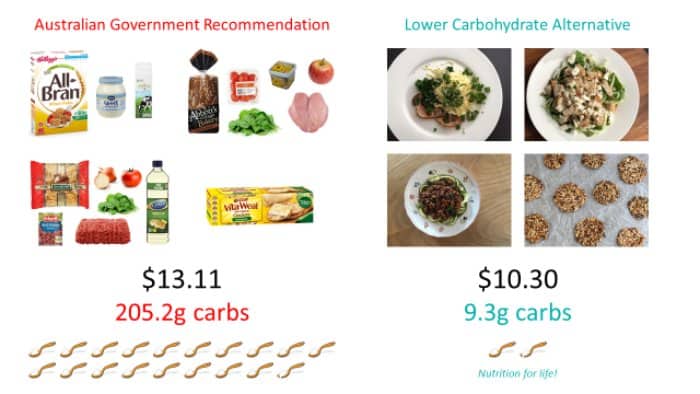
What if you could actually take control of
your health in just 10 days?
It’s not your fault you can’t lose weight as a woman over 40 even though you’ve likely tried literally everything. Your metabolism probably feels broken and your hormones are likely all out of whack.
But you can fix it all with ONE simple change: eliminate sugar. We make it super easy with daily lessons teaching you the science behind what makes us gain weight in our midlife and beyond! Are you ready to get started now?



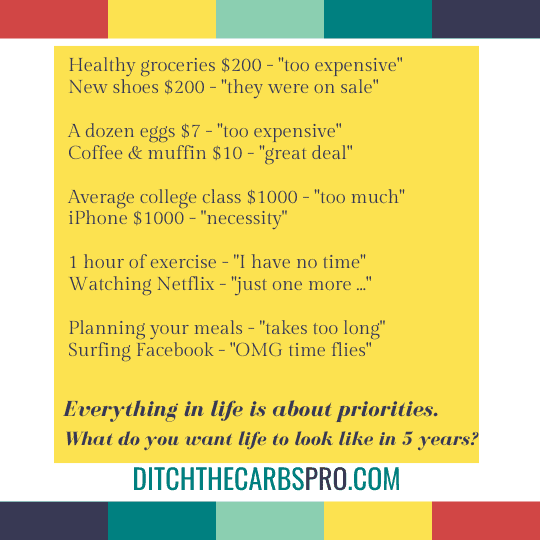
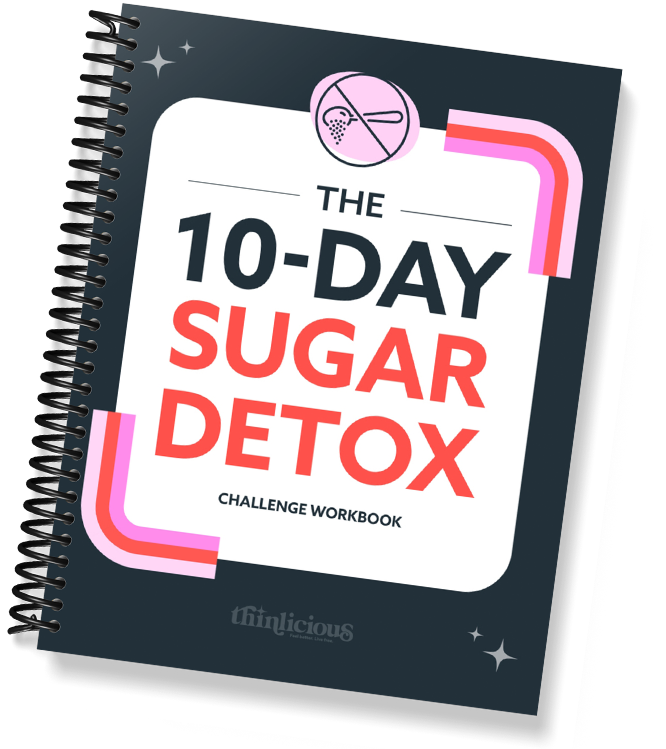






I love this article. You did a great job with the cost/meal comparisons! It’s great that you debunked the misconception that going low carb, or making healthier eating choices is more expensive — it really is pretty much the same (the only that gets pricey for me is when I have to stock up on my spices!) — I went low carb almost a year ago, and what I spend at the grocery store is what it is. Sure, I could get ramen of cup of noodle for $5 for the whole week, but ehhh. The only big difference in price I’ve ever seen is when I buy organic, which I am slowly doing, when I can. Its a huge misconception that eating cooked meals vs processed/ready-to-go meals is more expensive. But, the satisfaction and “fullness” your belly gets from eating the right foods I believe makes you eat less often.
Actually, since I’m in LCHF style, I don’t need to snack at all. Also I only have a cup of dark tea with some cream for breakfast. Mmm… I din’t check it but with only two complete, nutritious and delitious meals a day perhaps I’m saving money!
Since going low carb my weight is remarkably stable. I figure that if continuing a high carb diet, by now I would have put on considerable weight and would be consuming considerably more calories each day, which would add to my food cost.
But mister, there is also something called time cost.
Not just money, but time(for preparation) also.
And how much time does it take to visit doctors, pharmacies, physiotherapists etc … We must invest in ourselves, time and money. With everything in life, it comes down to priorities. I have so many recipes that are super quick and easy. Slow cooker meals, using leftovers, batch cooking … in fact, the simpler cooking is, the more sustainable it is. I am a very busy mum with a family of 5. My mantra here is Real Food, Real Easy.
Low carb has certainly proven cheaper for me in the long term. Yes some of the oils can be pricey and I only buy Kerrygold butter which is one of the most expensive buttes in the Uk. Almond and coconut flours are expensive too. Also buying new clothes was a short term cost but I bought from charity shops as much as possible to keep those costs down.
I now rarely feel hungry and am able to get by on one meal a day. I’m essentially on 23/1 intermittent fasting. So my food bill overall has dropped considerably. Also my car now carries 77lbs less so there’s a fuel saving there!
Another saving has been with my dentist. At my last check up I was told I didn’t need to be seen again for another year rather than in the usual six months. One thing that isn’t mentioned much in the low carb community is that a hflc diet is good for your teeth.
why do you only buy Kerrygold (I am in the UK too). In the US Kerrygold is a ‘thing’ because they don’t tend to have grass fed dairy products but in the UK most, if not all, of our dairy is mostly grass fed
I’ve found making healthier choices is pricey. Sausages without the fillers are $16kg, where as rice filled gluten free snags are $7kg. I buy nitrite free bacon $25kg, but from the supermarket (with nitrites) is $10kg. Fortunately cheaper cuts of meat go well in the slow cooker, and buying seasonal veggies helps too. But overall I’ve found I spend more – food with less rubbish ingredients costs more than that without cheap fillers.
So true, but indeed we need to realise the sausages that are packed with fillers, only contains a small percentage of real food or meat in them, so if we calculated the amount of meat in each sausage, they are probably the same meat kg/$.
My 9 year old boy would easily eat 4 of the cheaper sausages with fillers but since changing to pure meat sausages, he can only manage 2 sausages. I now buy less meat but of a good quality. I’ve also found that cheaper chicken breast shrink so much on cooking.
I was going to say something similar. You need less as once they are cooked, they have maintained their bulk rather than shrinking to half their original size.
I spend $150 a month on “real” food for myself and my dog (yes, I feed him a natural diet as well). I have been doing LCHF for nearly 3 years and love, love, love all the health benefits and great nutrition I have been getting because of it. As for my meal prep, I cook everything from scratch and most evenings it maybe takes me 15 minutes to cook a nutritional meal. I use my crockpot a lot. I don’t eat or buy snacks, drinks, etc. I drink either black coffee or plain tea. Giving up sweets was not an issue for me because I never linked them to begin with. But oh did I love my potato chips. I do miss them greatly, but I’ve also found a work around for them. I wish everyone the best on their journeys to a happy and healthy life.
Awesome tips Pam, thank you. They are super helpful. And I agree, stopping the snacks and drinks has a HUGE impact n the wallet (and the hips).